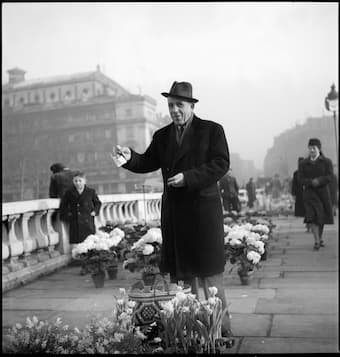
Francis Poulenc out on the town
In his 1921 collection Promenades, Francis Poulenc presents us with an odd world of travel. Rarely performed because of its technical and musical difficulties, Promenades gives us an audio image of travel in early 20th century France. One writer compares this to a Dali- or Magritte-like world of motion, where nothing is quite what it seems. Or, perhaps, is presented as a reality rather than a theoretical way of getting about.
He opens with the most basic mode of transportation: your own two feet. We travel around the city at a slow walking pace, taking in the sights of the town.

Coffee drinkers on the avenue
Francis Poulenc: Promenades, FP 24 – No. 1. A pied (Pascal Rogé, piano)
Then, we get into one of the most radical forms of transportation in the 1920s: the automobile. Immediately the pedal is put to the metal and we’re traveling at speed – high speed. The driver is breaking all the speed laws and we’re clutching the dashboard for safety!
Francis Poulenc: Promenades, FP 24 – No. 2. En auto (Pascal Rogé, piano)
Then, it’s a horse. We return to decorum and a sense of civilization.
Francis Poulenc: Promenades, FP 24 – No. 3. A cheval (Pascal Rogé, piano)
Off the horse and into a boat. A boat on very disturbed water. The waves undulate and we’re left with a hint of sea sickness.
Francis Poulenc: Promenades, FP 24 – No. 4. En bateau (Pascal Rogé, piano)
Into an airplane! Instead of the exciting speed up of a take-off, we slowly rise and are immediately in the clouds, slowly floating above everything, dreaming as we peer out the windows at the landscape.
Francis Poulenc: Promenades, FP 24 – No. 5. En avion (Pascal Rogé, piano)
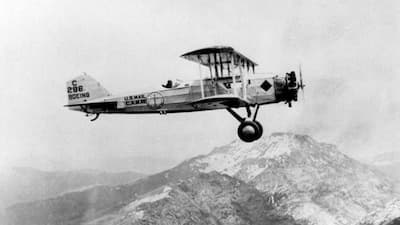
The White Bird biplane (1927)
And now, into a bus. Like the automobile, this bus is being driven by a crazy person. It’s overcrowded and all the streets filled with rubble. We are thrown left and right by the driver’s maniacal style. Will there be a crash? No, we alight safely at our stop.
Francis Poulenc: Promenades, FP 24 – No. 6. En autobus (Pascal Rogé, piano)

1920 Renault Autobus
Now change to a horse and carriage! Calm and rational life return. The horse steps daintily down the avenue.
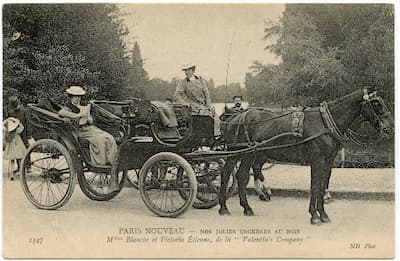
Horse and carriage
Francis Poulenc: Promenades, FP 24 – No. 7. En voiture (Pascal Rogé, piano)
On the train, where we’re in the hands of a competent driver with the route straight ahead. The train puffs and huffs and we arrive.
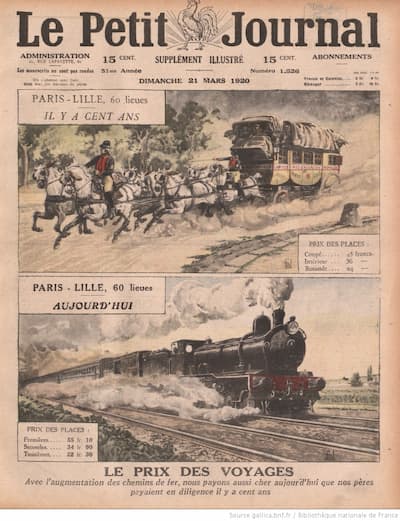
Train from Paris to Lille
Francis Poulenc: Promenades, FP 24 – No. 8. En chemin de fer (Pascal Rogé, piano)
On the bicycle, we may not be in actual control of the machine – we’re headed downhill, weaving everywhere!
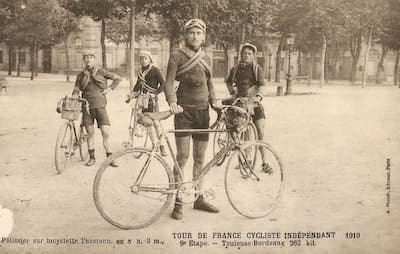
Cyclist in the 1920s Tour de France
Francis Poulenc: Promenades, FP 24 – No. 9. A bicyclette (Pascal Rogé, piano)
And now one of the oldest forms of transportation – the mail diligence. It’s late, we’re tired after all out adventures, and the equally tired postmen as blowing their horns and singing (but in different keys).
Francis Poulenc: Promenades, FP 24 – No. 10. En diligence (Pascal Rogé, piano)
The work was dedicated to Arthur Rubinstein, who gave the premiere at Wigmore Hall in London on 4 July 1923.
It’s very funny view of modern transportation by someone who was afraid of cars and buses and boats, but who seemed to find horses or horses and carriage, railroads, and airplanes much more calming ways to get about.
For more of the best in classical music, sign up to our E-Newsletter
